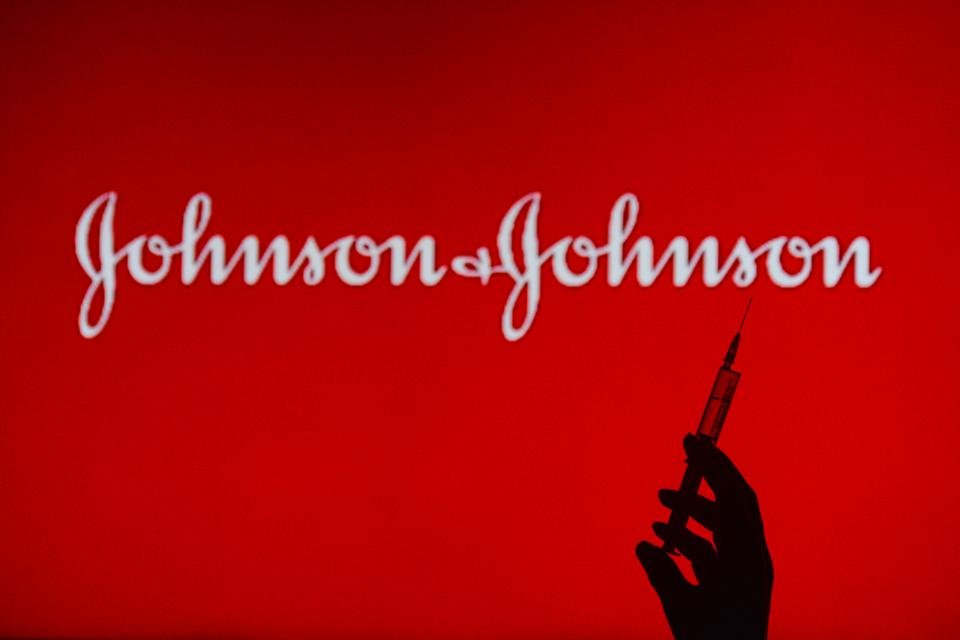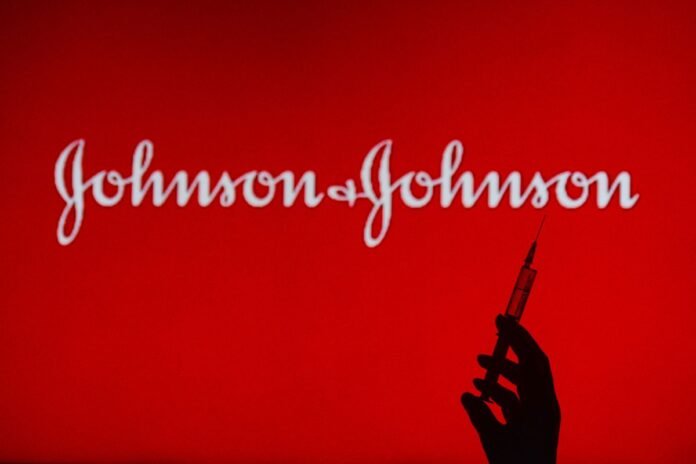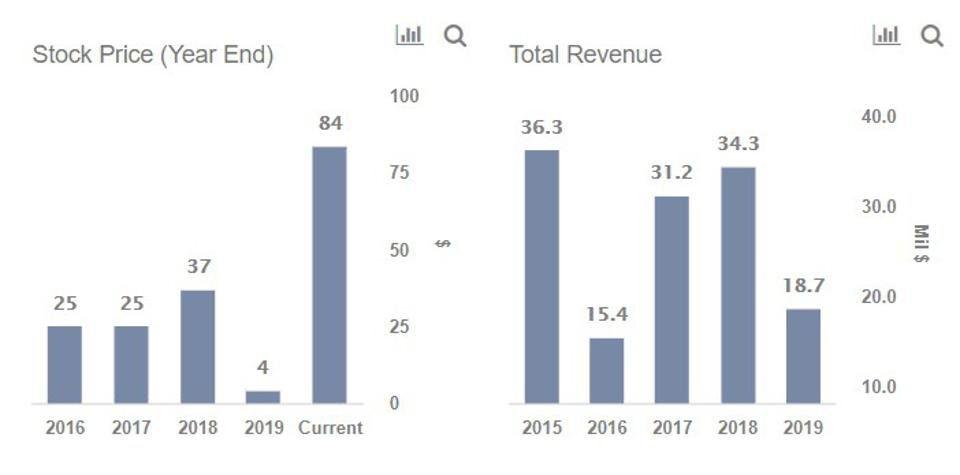
An illustrative image of a hand holding a medical syringe in front of the Johnson and Johnson logo … [+]
Johnson & Johnson (NYSE: JNJ) announced that its single-shot Covid-19 vaccine was 66% effective in preventing moderate and severe cases of Covid-19 in its global phase 3 trials. Efficacy varied by region, with the shot proving 72% effective in the U.S., 66% effective in Latin America, and around 57% effective in South Africa. Although the headline efficacy figures put J&J
See our indicative theme of Covid-19 Vaccine stocks – which includes a diverse set of U.S.-based pharma and biotech companies developing Covid vaccines.
[1/25/2021] Johnson & Johnson Vaccine Updated
Johnson & Johnson’s Covid-19 vaccine is one of the most closely watched shots against the novel coronavirus, given that it is backed by one of the world’s largest pharma companies and is expected to require only a single dose. Here’s a quick rundown of the expected timeline for the vaccine’s launch. Johnson & Johnson is expected to provide data from its phase 3 trial of around 45k participants around the last week of January or the first week of February and file for emergency use approval with the U.S. FDA post that if the results are positive. The process of preparing and filing for an application could take a week or two, after which the FDA review and potential approval is likely to take another two to three weeks. For perspective, the FDA review process took about three weeks for Pfizer and slightly less for Moderna. Considering this, it’s likely that the J&J shot should be approved for use by sometime in March.
This would put the shot at least two to three months behind Pfizer, which received emergency approval from the FDA on December 11, 2020. That being said, there’s plenty of room for the company to scale up as vaccination drives are still in the very early stages. Per the Bloomberg vaccine tracker, only around 66 million people, in the 56 countries being tracked, have been vaccinated. The U.S. has administered 22.4 million doses. [2] Moreover, J&J’s shot should see strong demand, given that it is likely to be a one-dose vaccine that is apparently going to be easy to store and distribute, helping to make mass vaccination drives much more straightforward.
See our indicative theme of Covid-19 Vaccine stocks – which includes a diverse set of U.S.-based pharma and biotech companies developing Covid vaccines.
[1/15/2021] Johnson & Johnson Vaccine Updates
Johnson & Johnson is developing one of the most closely watched Covid-19 vaccines, considering that it is a single-dose shot that should be relatively easy to distribute. Here’s a quick rundown on the recent developments for the vaccine. Based on data from the phase 1/2 trials of 805 participants, published on Wednesday, the vaccine generated a long-lasting immune response with 90% of participants generating neutralizing antibodies against the Coronavirus. [3] Based on these early-stage findings the company expects the vaccine to be more than 70% effective, noting that efficacy could reach “very high levels”. For perspective, the Pfizer and Moderna vaccines, which are being rolled out in the U.S. are over 90% effective. More conclusive efficacy data from J&J’s phase 3 study which has 45,000 volunteers is expected in the coming weeks with the company likely to proceed with emergency approval if the results are favorable.
Separately, there have been reports that the company is seeing some manufacturing delays for the vaccine. While J&J was expected to deliver 12 million doses by the end of February and 100 million by the end of June, it has reportedly fallen behind these goals by as much as two months. [4] As of last September, the company said that it had plans to deliver over a billion doses by the end of 2021.
[1/6/2021] What’s Happening With Johnson & Johnson’s Covid-19 Vaccine?
Johnson & Johnson is expected to report interim data from the phase 3 trial of its Covid-19 vaccine candidate this month, providing insight into its safety and efficacy. The company has completed enrollment on the trial, with 45,000 people for the trial, below its initial target of 60,000, although this is unlikely to make a difference as higher rates of Coronavirus infections in the U.S. are likely to allow it to gather the data it needs with fewer volunteers. If all goes well, J&J could apply for emergency use approval from the U.S. FDA as early as February. Although J&J is at least two months behind Pfizer (NYSE: PFE) and Moderna (NASDAQ: MRNA) who have already started to roll out their vaccines, J&J’s shot could be much sought after if it proves as safe and effective as rivals, considering that it likely requires only a single dose, unlike rival vaccines which require two shots to be given a few weeks apart.
Overall, the vaccine isn’t expected to really move the needle for J&J financially, as it intends to sell the vaccine at cost through the pandemic. However, the vaccine should help the company rebuild its brand image after it faced setbacks amid lawsuits relating to contamination of its baby and other talc products. Secondly, the end of Covid-19 should bode well for diversified healthcare companies like Johnson and Johnson, as hospital visits and elective procedures rise. The focus could also shift back to the company’s blockbuster drugs, including Stelara, Imbruvica, and Darzalex, which posted about 22% y-o-y growth over the first nine months of 2020.
See our indicative theme of Covid-19 Vaccine stocks – which includes a diverse set of U.S.-based pharma and biotech companies developing Covid vaccines.
[Updated 12/7/2020] Covid-19 Vaccine stocks
Johnson & Johnson is seen as a key player in the Covid-19 vaccine race. The company started phase 3 trials in September and expects to file for emergency approval by early 2021 if the vaccine is safe and effective. While rivals Pfizer and Moderna’s vaccines will have a head start, given that they have completed phase 3 trials with exceptionally strong results and are likely to start shipping their vaccines in the coming weeks, Johnson & Johnson’s candidate remains promising for a couple of reasons. Firstly, the company is targeting a single-dose regimen for the vaccine, unlike most of the other players which require two doses (although it also started a two-dose regimen to evaluate incremental benefits). This should make it much easier to administer at the time of a pandemic, putting less stress on the healthcare infrastructure. Secondly, the distribution could also be relatively seamless as the vaccine is expected to remain stable for at least three months at refrigerator-like temperatures, unlike some other vaccines (such as Pfizer’s) that need specialized freezers. The vaccine is also likely to be relatively affordable. Per a deal with the U.S. government, Johnson & Johnson has priced its vaccine at about $10 per dose. That’s well below Pfizer’s ($19 per dose) and Moderna ($25 to $37 per dose). Although the vaccine is unlikely to move the needle for the company in the near-term, as it will provide the shots for a not-for-profit basis through the pandemic, it could have an incremental impact post that.
See our indicative theme of Covid-19 Vaccine stocks – which includes a diverse set of U.S.-based pharma and biotech companies developing Covid vaccines.
[Updated 11/4/2020] Covid-19 Vaccine stocks
Our indicative theme of Covid-19 Vaccine stocks – which includes a diverse set of U.S.-based pharma and biotech companies developing Covid vaccines – is up by about 560% year-to-date, on an equally weighted basis, compared to the S&P 500 which has gained just about 4% over the same period. While most vaccine stocks declined last week, amid a broader sell-off in the markets, they are likely to come back into the spotlight as efficacy data from late-stage trials is expected from frontrunners Pfizer (NYSE: PFE) and Moderna (NASDAQ
Novavax
NVAX
Moderna , a clinical-stage biotech company, is carrying out phase 3 trials of its Covid-19 vaccine, completing enrollment of 30,000 participants. The company is likely to have data on whether its vaccine works or not by this month, and has noted that it would seek emergency approval from the FDA if the vaccine is at least 70% effective. The stock is up 253% this year.
Johnson & Johnson: Unlike most other vaccine candidates, which are likely to require two shots, J&J is targeting a single-dose vaccine. While the company had to pause trials in mid-October after an illness was reported in a volunteer, the company is now preparing to resume trials. The stock is down by -5.1% this year.
Pfizer is working with German partner BioNTech on a Covid-19 vaccine. The company is likely to have efficacy data from late-stage trials available shortly. The company could supply about 40 million doses in the United States in 2020 if the data is positive and regulators approve the vaccine. The stock is down by about -7.6% this year.
While Johnson & Johnson stock might be worth considering, 2020 has also created many pricing discontinuities that can offer attractive trading opportunities. For example, you’ll be surprised how counter-intuitive the stock valuation is for Pfizer vs Merck.
See all Trefis Price Estimates and Download Trefis Data here
What’s behind Trefis? See How It’s Powering New Collaboration and What-Ifs For CFOs and Finance Teams | Product, R&D, and Marketing Teams
























